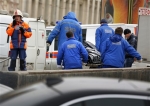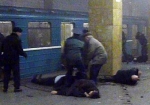29 March 2010
Double suicide bombings kill 36 on Moscow subway

 MOSCOW — The head of Russia's main security agency says Caucasus rebels are believed to have carried out two sucide bombings on Moscow's subway system that killed 36 people.
MOSCOW — The head of Russia's main security agency says Caucasus rebels are believed to have carried out two sucide bombings on Moscow's subway system that killed 36 people.
Officials say two female suicide bombers blew themselves up on trains as the subway was packed with rush-hour passengers Monday morning.
In a televised meeting with President Dmitry Medvedev, the head of the Federal Security Service said preliminary investigation points to terrorists connected to the restive Caucasus region that includes Chechnya.
Alexander Bortnikov said the assessment was based on fragments of the bombers' bodies. He did not elaborate.
THIS IS A BREAKING NEWS UPDATE. Check back soon for further information. AP's earlier story is below.
MOSCOW (AP) — Two female suicide bombers blew themselves up on Moscow's subway system as it was jam-packed with rush-hour passengers Monday, killing at least 35 people and wounding 38, the city's mayor and other officials said.
 Emergency Ministry spokeswoman Svetlana Chumikova said 23 people were killed in an explosion shortly before 8 a.m. at the Lubyanka station in central Moscow. The station is underneath the building that houses the main offices of the Federal Security Service, or FSB, the KGB's main successor agency.
Emergency Ministry spokeswoman Svetlana Chumikova said 23 people were killed in an explosion shortly before 8 a.m. at the Lubyanka station in central Moscow. The station is underneath the building that houses the main offices of the Federal Security Service, or FSB, the KGB's main successor agency.
A second explosion hit the Park Kultury station about 45 minutes later. Chumikova said at least 12 were dead there. The ministry later said 38 people were injured.
"I heard a bang, turned my head and smoke was everywhere. People ran for the exits screaming," said 24-year-old Alexander Vakulov, who said he was waiting on the platform opposite the targeted train at Park Kultury.
"I saw a dead person for the first time in my life," said 19-year-old Valtin Popov, who also was standing on the opposite platform.
Moscow Mayor Yuri Luzhkov said both explosions were believed to have been set off on the trains.
"The first data that the FSB has given us is that there were two female suicide bombers," Luzhkov told reporters at the Park Kultury site.
The blasts practically paralyzed movement in the city center as emergency vehicles sped to the stations.
In the Park Kultury blast, the bomber was wearing a belt packed with plastic explosive and set it off as the train's doors opened, said Vladimir Markin, a spokesman for Russia's top investigative body. The woman has not been identified, he told reporters.
A woman who sells newspapers outside the Lubyanka station, Ludmila Famokatova, said there appeared to be no panic, but that many of the people who streamed out were distraught.
"One man was weeping, crossing himself, saying 'thank God I survived'," she said.
The last confirmed terrorist attack in Moscow was in August 2004, when a suicide bomber blew herself up outside a city subway station, killing 10 people.
Responsibility for that blast was claimed by Chechen rebels and suspicion in Monday's explosions is likely to focus on them and other separatist groups in the restive North Caucasus region.
Russian police have killed several Islamic militant leaders in the North Caucasus recently, including one last week in the Kabardino-Balkariya region. The killing of Anzor Astemirov was mourned by contributors to two al-Qaida-affiliated Web sites.
The killings have raised fears of retaliatory strikes by the militants.
In February, Chechen rebel leader Doku Umarov warned in an interview on a rebel-affiliated Website that "the zone of military operations will be extended to the territory of Russia ... the war is coming to their cities."
Umarov also claimed his fighters were responsible for the November bombing of the Nevsky Express passenger train that killed 26 people en route from Moscow to St. Petersburg.
The Moscow subway system is one of the world's busiest, carrying around 7 million passengers on an average workday, and is a key element in running the sprawling and traffic-choked city.
Helicopters hovered over the Park Kultury station area, which is near the renowned Gorky Park.
Associated Press Writers Jim Heintz and Mansur Mirovalev in Moscow contributed to this report.
Copyright © 2010 The Associated Press. All rights reserved.
19:42 Posted in RUSSIA | Permalink | Comments (2) | ![]() Facebook |
Facebook |



















Comments
Great Blog I am Certified to your blog Because I have Searched and visited blog contents are Unique. if your blog were not post unique so I would not post my comment.
Posted by: dissertation posterous blog | 29 March 2010
Great Blog I am Certified to your blog Because I have Searched and visited blog contents are Unique. if your blog were not post unique so I would not post my comment.
Posted by: dissertation posterous blog | 29 March 2010
The comments are closed.